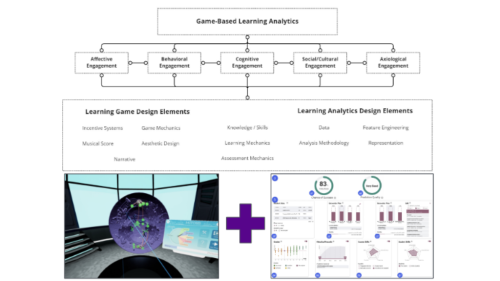One of the critiques of learning analytics is that it can contribute (intentionally or otherwise) to perpetuating historical patterns of inequality. This new stream of work, initiated to help address systemic racism in education, seeks to upend that relationship by unpacking the assumptions that commonly underlie learning analytics solutions and exploring how they can be used as a tool for equity and social justice.
Equitable Game-Based Learning Analytics

Improving Learning in Educational Games through Equitable Game-Based Learning Analytics
This project is a collaboration between LEARN and The Consortium for Research and Evaluation of Advanced Technologies in Education (CREATE). It focuses on the development of the concept of Equitable Game-Based Learning Analytics (EGBLA), which is at the intersection of the fields of Game-Based Learning and Learning Analytics. EGBLA uses educational games both as a source of rich information about student thinking and actions, but also novel in both fields, as the medium through which the feedback is provided to students to increase inclusive learning and promote self-regulation in a diverse group of learners.
The main expected result of the project is the identification of effective and equitable ways to provide students with actionable feedback about their own learning process and progress in educational games. To achieve this result, the project will propose a multi-theory supported initial framework for EGBLA. Guided by this framework, and through participatory design with a diverse set of game designers, learning designers, instructors, and students/players, this project will explore promising points in the problem and solution space of EGBLA.
Subversive Analytics

Student In-Sight
Learning Analytics can heighten power imbalances between students and faculty by creating asymmetrical visibility, where students’ academic and demographic data is shared with faculty, while students themselves are unaware of what is shared and to whom. The information shared, moreover, can paint a limited and reductionistic picture of students who have no opportunity to provide context for the information. This is particularly problematic in the context of historical patterns of inequality in educational access and opportunity. This project innovates new designs to address this challenge by fostering transparency in information sharing and allowing students to annotate their data. The aim is to generate a tool that encourages different members of educational communities (students, teachers etc.) to share perspectives that foster better understanding of the contexts and identities that are meaningful to each other.
Imagined Tools for Thinking
This project works with diverse stakeholders to create and compile sketches of imagined analytics tools that problematize aspects of the current status quo such as issues of misrepresentation, underrepresentation, and non-representation (missing but relevant data), as well as concerns about privacy, transparency, power and bias. These sketches can serve to inspire LA designers and constitute “objects to think with” for the mindful and critical use of LA.

